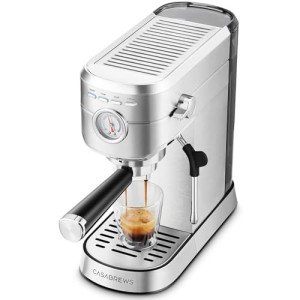Energy-Efficient Espresso Machines: A Comprehensive Guide
Worldwide of coffee enthusiasts, espresso machines are frequently considered vital home appliances for brewing abundant, aromatic coffee. Nevertheless, the energy intake related to these machines can result in increased energy bills and ecological issues. As consumers become more eco-conscious, energy-efficient espresso machines have actually emerged as a popular choice. This article aims to check out the features, benefits, and choices readily available in energy-efficient espresso machines, assisting coffee enthusiasts make notified options.
What Makes an Espresso Machine Energy-Efficient?
Energy-efficient espresso machines are designed to lessen energy consumption while maintaining ideal performance. Several features add to the energy efficiency of these machines:
- Insulation: High-quality insulation assists retain heat, minimizing the energy required to keep optimal developing temperatures.
- Smart Technology: Many modern machines are equipped with programmable settings that permit users to schedule developing times and change to standby mode when not in use.
- Quick Heat-up Time: Energy-efficient espresso machines typically use sophisticated heating technologies, such as thermoblocks or PID controllers, to heat water rapidly.
- Low Wattage: Machines that operate at lower wattages take in less energy in general, making them more effective.
- Vehicle Shut-off: Automatic shut-off includes ensure that the machine turns off after a specific duration of lack of exercise, additional minimizing energy waste.
Advantages of Energy-Efficient Espresso Machines
Buying an energy-efficient espresso machine can provide several advantages:
- Cost Savings: Over time, lower energy usage can lead to minimized electrical energy bills.
- Environmental Impact: Using less energy lowers carbon footprints, making these machines a more sustainable choice for ecologically mindful customers.
- Enhanced Performance: Many energy-efficient designs likewise use exceptional brewing technologies, resulting in better-tasting espresso.
- Sturdiness: Typically, energy-efficient machines are built with high-quality components, causing greater longevity.
Features to Consider
When picking an energy-efficient espresso machine, a number of functions ought to be taken into consideration:
- Type of Machine: Options consist of manual, semi-automatic, and totally automatic designs, each with varying degrees of user control and automation.
- Brew Quality: Look for machines that utilize high-quality developing systems to guarantee ideal flavor extraction.
- Upkeep: Some machines have self-cleaning functions that can conserve energy and effort in upkeep.
- Capability: Depending on personal or family size, machine capacity can affect energy intake, with larger machines frequently needing more power.
Popular Energy-Efficient Espresso Machines
The market provides a range of energy-efficient espresso machines catering to different requirements and preferences. Below are some noteworthy models:
| Brand | Design | Key Features | Energy Consumption |
|---|---|---|---|
| Breville | Barista Express | Integrated grinder, PID temperature level control, fast heat-up. | Low |
| DeLonghi | EC155 | Compact size, simple to use, resilient build. | Moderate |
| Rancilio | Silvia | Durable style, outstanding temperature stability, and has a low ecological effect. | Moderate |
| Gaggia | Traditional | Reliable manual operation, long lasting brass elements, and efficient steaming ability. | Low |
| Jura | E8 | Fully automatic, smart functions, and a detachable brew group for simple cleaning. | Low |
Tips for Optimal Energy Efficiency
Aside from picking an energy-efficient model, consumers can embrace a number of practices to take full advantage of energy efficiency:
- Preheat: If your machine has a pre-heating function, use it to make sure that the optimal temperature level is reached rapidly before developing.
- Shut off After Use: Always switch off the machine after brewing or utilize machines with car shut-off features.
- Regular Maintenance: Keep the machine well-kept to guarantee it operates efficiently and effectively.
FAQs About Energy-Efficient Espresso Machines
1. Are energy-efficient espresso machines more pricey?
While the initial investment may be higher for energy-efficient designs, the long-term savings on electricity costs can offset the preliminary cost. Additionally, lots of energy-efficient machines included sophisticated features that enhance the brewing experience.
2. How do I understand if an espresso machine is energy-efficient?
Search for signs such as Energy Star certification, user reviews, and requirements relating to wattage and heat-up time. Machines with particular functions aimed at lowering energy usage are generally created for much better effectiveness.
3. Can Pump Espresso Machines use an energy-efficient espresso machine for other coffee styles?
Many energy-efficient espresso machines provide versatility, permitting users to brew different coffee styles beyond espresso, such as lattes and coffees, by incorporating steaming capabilities.
4. Do energy-efficient models compromise quality for performance?
Not necessarily. here -efficient espresso machines are equipped with high-quality brewing innovation that can boost taste extraction while decreasing energy usage.
5. What upkeep is required for energy-efficient espresso machines?
Routine upkeep involves cleaning the machine, descaling when required, and periodically examining seals and gaskets to make sure optimum efficiency and energy efficiency.
Energy-efficient espresso machines represent an ideal mix of performance, cost savings, and environmental duty. By thinking about different features, benefits, and brand names, consumers can choose a model that suits their unique choices while contributing favorably to the environment. As the trend toward sustainable living grows, the popularity of energy-efficient appliances, consisting of espresso machines, is most likely to continue its upward trajectory, providing coffee fans a guilt-free way to enjoy their everyday dose of espresso.

